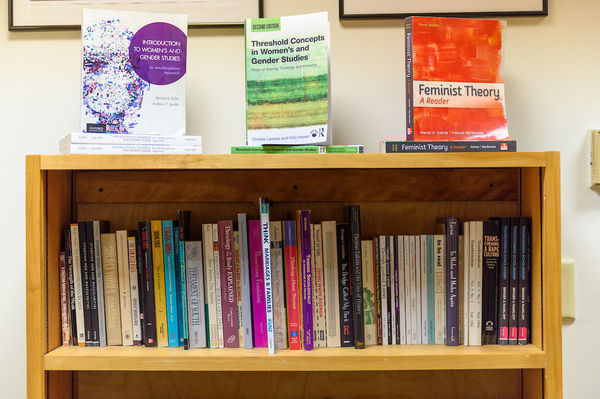Courses

Gender Studies core courses—Introduction to Gender Studies, Perspectives on Gender, and the Interdisciplinary Seminar—are interdisciplinary and discussion-based, and they prioritize critical thinking and praxis.
Gender Studies elective courses can be found in more than 20 departments across and beyond the College of Arts & Letters, and are as diverse as those disciplines and areas of study. Core Electives offer especially deep dives into the study of gender and sexuality.
Majors and minors in Gender Studies consult with the Director of Undergraduate studies to craft an individual curriculum that suits their interests and needs.
“Immersing myself in the Gender Studies curriculum was one of my best decisions while at ND. It greatly expanded my vision of the world and of social justice."
—Michael Zimmer ’94
For the most up-to-date list of this semester's Gender Studies courses, visit classsearch.nd.edu
Required Courses
Introduction to Gender Studies (GSC 10001)
This course invites students to explore the interdisciplinary field of gender studies. It also introduces students to gender itself—gender as identity, as a social/cultural formation that organizes human societies, as a mode of self-expression, and as a critical lens through which to better understand the world. We will explore how gender is experienced, produced, and performed at the intersection of culture, politics, and the body, always in conjunction with other factors of power and difference such as race, nation, sexuality, embodiment, and socioeconomic class. We will ask how institutions like work, family, and government interact with gender in the U.S. and in local contexts around the world. We will think critically about how ideology (systems of ideas and knowledge) and representation (portrayals in media, political discourse, and everyday life) shape our understanding of gender. The study of gender reaches into, across, and beyond academic disciplines. This course will draw on research and thinking both from within gender studies and across many other fields, taking up debates and conversations from history, sociology, anthropology, biology, literature, philosophy, and other disciplines that engage gender as a subject of knowledge. Student participation is central to individual and collective success in the course. Our class time will include a mix of lecture, discussion, and other activities.
Fulfills University and College Requirements in Social Science
Perspectives on Gender: Theory and Practice (GSC 40001)
This interdisciplinary seminar provides students with an overview of key concepts and terms in gender theory. Students will read prominent feminist and queer theorists of gender, analyze their arguments, and learn to critique and apply them. We will begin with early feminist explorations of gender. However, we will also explore contemporary theories, including those that move our understanding of gender outside heteronormativity and beyond the binaries of male/female and masculine/feminine. Our constant concern is to consider what these theories mean in their specific sociohistorical contexts and to contemplate their potential implications for our own and others’ lives, not to mention culture and society at large. This seminar requires close reading and discussion of theoretically rigorous and critically sophisticated texts and thus requires the active participation of committed students.
Interdisciplinary Seminar (GSC 43000/63000)
Students in the Interdisciplinary Seminar read widely across feminist and queer scholarship in multiple fields, including the interdisciplinary field of Gender Studies, and consider how disciplinary norms and boundaries shape scholarly inquiry. Student research and writing for the course will synthesize disciplinary ways of knowing and produce original, interdisciplinary Gender Studies scholarship or creative work. The Interdisciplinary Seminar fulfills both the IS requirement for Gender Studies graduate minors and the capstone requirement for Gender Studies primary and supplemental majors. Although each iteration of the course focuses on a unique topic, all Interdisciplinary Seminars put multiple disciplines in conversation in order to deepen students’ mastery of key Gender Studies concepts.
Senior Thesis (GSC 48001/48002)
In collaboration with the Director of Undergraduate Studies in Gender Studies, students choose a Gender Studies faculty member who will guide them through the year-long composition of a senior thesis. The senior thesis is a professional piece of scholarly writing featuring original research based on the student's interdisciplinary research in their gender studies major, ideally incorporating any additional fields of study they are pursuing. The Gender Studies senior thesis may build upon, but cannot replicate, the work done for a senior thesis or paper in another major or course. This course fulfills the senior capstone project requirement for Gender Studies majors. It is taken in the fall semester of the senior year (3 credits) and finished in the spring semester (3 credits).
Capstone Essay (GSC 48000)
In collaboration with the Director of Undergraduate Studies in Gender Studies, students choose a Gender Studies faculty member who will guide them through the semester-long composition of a capstone essay. The capstone essay is an original and professional piece of scholarly writing based on the student's interdisciplinary research in their primary and supplementary majors. The capstone essay may build upon, but cannot replicate, the work done for a senior thesis or paper in another major or course. This course fulfills the senior capstone project requirement for Gender Studies supplementary majors. It can only be taken in the fall semester of the senior year. In the spring semester of the junior year, interested students should speak to the Gender Studies Director of Undergraduate Studies about planning their thesis topic and research and securing a faculty advisor.
Gender Studies Core Electives
Primary and supplementary majors must draw at least 3 of their elective courses from the Core Electives list. Core Electives build upon Gender Studies required courses by inviting deeper exploration of topics, theories, and methods rooted in the critical study of gender and/or sexuality. Core elective courses are taught by professors across many departments who are concurrent, affiliated, or adjunct faculty in Gender Studies.
Each Core Elective includes the culturally and historically situated study of power, identity, and/or representation, with a central focus on gender and/or sexuality. These courses engage feminist, queer, and/or trans theories and methodologies from the interdisciplinary field of gender studies and other disciplines.